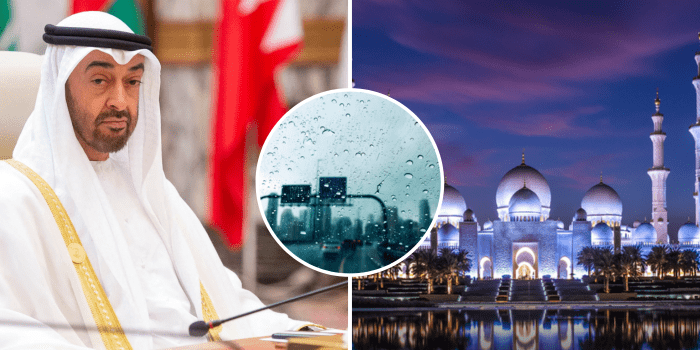National Call for Rain Prayer
The United Arab Emirates has announced that Salat al-Istisqa—the traditional Islamic prayer for rain—will be performed across all mosques on Friday. The decision follows a prolonged period of dry weather that has left most regions of the country without rainfall for several weeks.
According to an official statement, the initiative comes under the directives of UAE President Sheikh Mohamed bin Zayed Al Nahyan. The special prayer will be held 30 minutes before the regular Friday prayers in mosques across all emirates, including Abu Dhabi, Dubai, Sharjah, and Ras Al Khaimah.
During the prayer, worshippers will collectively supplicate to Allah for barakah (divine blessings) and the return of rain, which is vital for agriculture, the environment, and the nation’s overall well-being.
Appeal for Humility and Faith
The UAE government has urged citizens and residents alike to join the prayers with sincerity, humility, and faith. Officials stated that communal prayers represent not only a spiritual act but also a powerful expression of unity and hope in times of environmental challenge.
The leadership encourages all people—nationals and residents—to turn to God with hearts full of humility and gratitude, the official announcement said. Collective prayer and faith can be a source of strength and renewal.
Religious scholars in the UAE have also emphasized that Salat al-Istisqa is a prophetic tradition. It is performed when rainfall ceases and signs of drought appear, serving as both a call for divine mercy and a reminder of humanity’s dependence on nature.
Dry Conditions Persist Across the Emirates
The UAE has been experiencing an unusually dry period in recent months. Meteorological data from the National Center of Meteorology (NCM) indicates that rainfall levels have dropped significantly compared to seasonal averages. Some areas have gone more than eight weeks without measurable rain, while daytime temperatures have risen well above 40°C (104°F).
The prolonged dryness has left the soil parched and increased dust levels, prompting environmental experts to call for water conservation and sustainable practices. While the UAE has previously relied on cloud seeding technology to stimulate rainfall, authorities have chosen a spiritual approach this time, highlighting the country’s balance between faith and innovation.
A Tradition Deeply Rooted in Islamic Practice
Salat al-Istisqa, or the prayer for rain, is deeply rooted in Islamic teachings. According to Islamic tradition, Prophet Muhammad (peace be upon him) performed this prayer during times of drought, gathering the community to seek divine mercy.
The prayer is typically offered in open spaces or mosques, accompanied by supplications and sermons that encourage repentance, generosity, and compassion. Across the Muslim world—from Saudi Arabia to Morocco—this practice continues to serve as a symbol of unity and faith during dry seasons.
In the UAE, the observance reflects not only a religious act but also a cultural connection to the nation’s Bedouin heritage, where rainfall has always been regarded as a precious blessing.
Balancing Technology and Faith
Over the past two decades, the UAE has become a global pioneer in weather modification, conducting hundreds of cloud seeding missions each year to enhance rainfall. However, this week’s call for Salat al-Istisqa underscores that the nation’s leadership continues to value the spiritual dimensions of life alongside scientific advancement.
Environmental analysts note that this dual approach—embracing both innovation and tradition—illustrates the UAE’s broader philosophy of integrating modernity with cultural and religious values.
A Nation United in Prayer
As worshippers across the Emirates prepare to gather this Friday, the call for rain serves as both a spiritual and environmental reminder. It highlights humanity’s shared dependence on nature and the importance of gratitude for life’s essential resources.
For many, the event represents more than a plea for rain—it is a reaffirmation of faith, community, and resilience amid the challenges of a changing climate.















